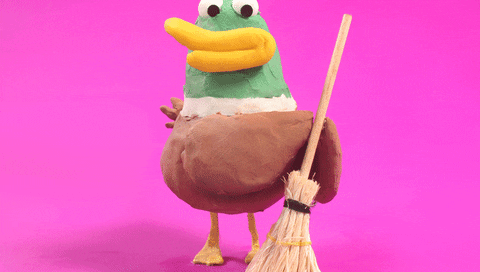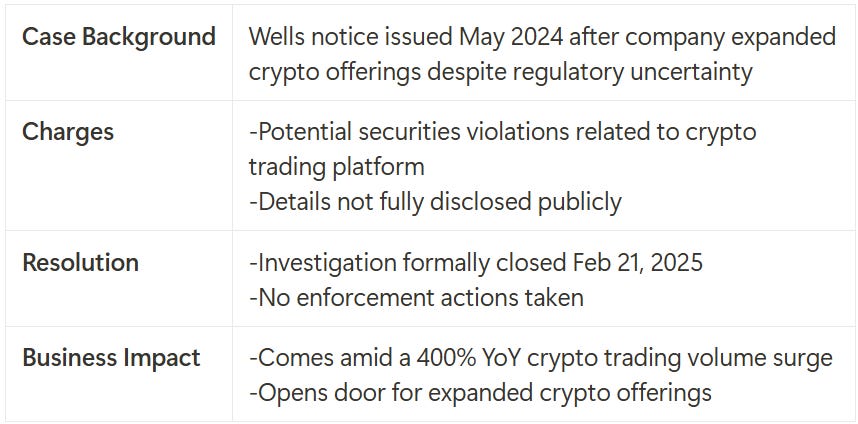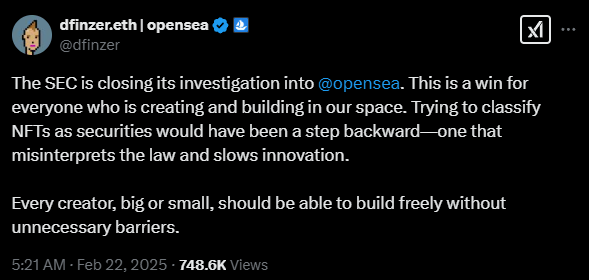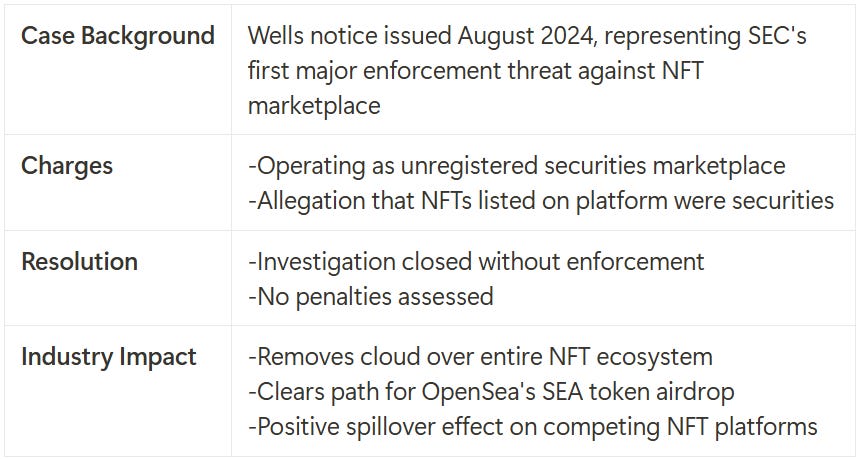Hello dispatchers!
It’s been a day of blood bath for crypto markets. Trust us when we say we feel you - and so do our portfolios. There’s some good news for the crypto world though.
We are beginning to see signs of crypto-friendly administration that we have all been anticipating for long now.
Last week, the US Securities and Exchange Commission (SEC)
Agreed to drop its Coinbase lawsuit "with prejudice"
Closed its investigation into Robinhood Crypto
Ended its probe of OpenSea's NFT marketplace
These are part of a systematic reversal of the Gary Gensler era's "regulation by enforcement" approach.
So many questions to address today: What these dismissals mean? Why are they happening now? and What's likely to be on the chopping block next?
Explore Verified DApps - All in One Place!
The New SEC Playbook
What a difference an election makes.
Just seven months ago, SEC Chair Gary Gensler declared that the "vast majority" of crypto tokens were securities. Today, the agency is systematically dismantling nearly every major crypto case it launched under his leadership.
The first signal came barely a couple of days after Donald Trump's inauguration as the US President when Acting SEC Chair Mark Uyeda announced the formation of a crypto task force. Led by Commissioner Hester Peirce (nicknamed "Crypto Mom" for her pro-industry stance), the task force telegraphed a dramatic shift.
"The SEC can do better," it said.
“Better”, in this case, means abandoning what industry critics called a "regulation by enforcement" strategy that saw the SEC target exchanges, token issuers, and even NFT marketplaces without providing clear guidelines on compliance.
The agency isn't waiting for Paul Atkins — Trump's nominee for SEC chair and a known crypto advocate — to be confirmed before making these changes. With only two sitting commissioners (both Republicans), the path has been cleared for a swift reversal of the Gensler-era enforcement actions.
What’s followed is a series of announcements that the crypto industry has welcomed with both hands.
Get 17% discount on our annual plans and access our weekly premium features (HashedIn, Wormhole, Rabbit hole and Mempool) and subscribers only posts.
Coinbase’s Victory Lap
Coinbase's announcement on Friday was unequivocal: the SEC had agreed to drop its lawsuit entirely, and with prejudice.
The lawsuit, filed in June 2023, had alleged Coinbase was operating as an unregistered securities exchange by listing 13 tokens the SEC claimed were securities. Among them were major cryptocurrencies like Solana and Filecoin.
The stakes couldn't have been higher. If the SEC had prevailed, Coinbase would have been forced to delist every cryptocurrency the agency hadn't explicitly blessed — a potential death blow to the largest US crypto exchange.
What's particularly notable is the "with prejudice" dismissal. As Arie Heijkoop, a partner at Haynes Boone, pointed out, this signals the SEC doesn't expect to bring similar cases back against Coinbase.
Result? Coinbase CEO Brian Armstrong took to X for a victory lap with a meme.
The dismissal also renders moot what could have been a landmark legal question.
Coinbase had secured an interlocutory appeal to the Second Circuit on whether "intermediated crypto transactions involve investment contracts" — a question that could have set precedent for the entire industry.
Now that clarity will need to come from somewhere else.
Robinhood's Reprieve
Even as crypto enthusiasts were still hailing Coinbase's win, Robinhood joined the celebrations. It said the SEC had formally closed its investigation into the platform's crypto trading operations without taking any enforcement action.
The case began in May 2024 when Robinhood received a Wells notice—the SEC's formal warning that it was considering enforcement action. That notice came at the height of the Gensler-led crackdown, when the agency was casting an increasingly wide net over the crypto industry.
Robinhood's Chief Legal Officer Dan Gallagher didn't mince words about the outcome.
"As we explained to the SEC, any case against Robinhood Crypto would have failed. We appreciate the formal closing of this investigation, and we are happy to see a return to the rule of law and commitment to fairness at the SEC."
The timing couldn't be better for Robinhood. The platform's crypto business has been booming, with trading volume up 400% year-over-year to $70 billion in Q4 2024. Cryptocurrency trading generated $358 million in revenue for the company — a sevenfold increase from the previous year.
Read: What’s Cookin’ at $COIN and $HOOD? 🧿
"Robinhood Crypto, as opposed to other platforms, made difficult choices not to provide certain products and services that the SEC under previous Chair Gensler alleged are securities in public actions," the company noted in its statement.
Speak about change of fortunes? The new regulatory winds in Washington, has positioned Robinhood to potentially expand its crypto offerings substantially in 2025. Since Q4 2024, the platform has already added seven new crypto assets in the US and launched Ethereum staking in the EU.
OpenSea's NFT Win
The third major announcement came from OpenSea, when founder and CEO Devin Finzer revealed the SEC had closed its investigation into the NFT marketplace.
This case had particularly broad implications. The SEC had issued a Wells notice to OpenSea in August 2024, suggesting it considered the non-fungible tokens listed on the platform to be unregistered securities.
At the time, Finzer called it "a sweeping move against creators and artists" and promised to "stand up and fight." That fight proved unnecessary as the agency backed down.
The dismissal comes at a crucial moment for OpenSea, which recently released a beta version of its OS2 platform and confirmed plans for a SEA token airdrop — something that would have been much more legally precarious under the previous regulatory environment.
The ripple effects extended beyond OpenSea itself.
Magic Eden's Chief Business Officer Chris Akhavan described it as a victory for the wider cryptocurrency space: "While we are competitors in the trenches, we share a deep belief in NFTs and what they will enable."
The market agreed. LooksRare's LOOKS token, associated with a competing NFT marketplace, saw a fivefold increase in active addresses shortly after the announcement.
The Pattern Emerges
The recent wave of case dismissals isn't without precedent. Even before the change in administration, cracks were beginning to appear in the SEC's aggressive stance.
Last year, the SEC ended its probe of stablecoin issuer Paxos' BUSD stablecoin after initial threats of enforcement action. Ethereum development studio Consensys also announced the SEC had dropped its investigation into "Ethereum 2.0," the network's transition to proof-of-stake.
What’s changed though is that the pace and scope of dismissals have accelerated dramatically under the new administration. In late January, the SEC announced a significant restructuring of its enforcement division, creating a new "crypto crime-fighting unit" to replace the Crypto Assets and Cyber Unit that had spearheaded Gensler's enforcement campaign.
The new unit is described as focusing on "combating cyber-related misconduct and protecting retail investors from bad actors" — a subtle but significant shift from targeting the industry itself to policing fraud within it.
In February, the SEC took another surprising step by voluntarily dismissing its own appeal of a ruling that prevented it from expanding securities laws to cover decentralised finance. This withdrawal represented a major victory for DeFi protocols that had operated under the constant threat of enforcement.
And most recently, when the SEC and Binance jointly requested a 60-day pause to their case (which was granted on February 14), they explicitly cited the "changing regulatory dynamics" and the creation of the SEC's crypto task force as justification.
Read: Has Binance Solved Its Legal Puzzle? 🧩
All these signal that there’s just one way the SEC is headed toward from here.
Block That Quote 🎙️
Hester Peirce, SEC Commissioner
"It took us a long time to get into this mess, and it is going to take us some time to get out of it."
Peirce acknowledged the complex regulatory tangle created during the Gensler era. Her comments suggest a methodical rather than hasty approach to reforming crypto regulation, even as case dismissals accelerate.
What's Next on the Chopping Block?
With three major cases resolved in a single week, it’s no longer a question if more dismissals are coming but which one’s the next.
The most obvious candidate is the SEC's long-running battle with Ripple over XRP.
As Bitwise general counsel Katherine Dowling noted, "I would expect that we should see action in the Ripple litigation next with review no doubt already underway. The SEC has spent years and millions scrapping with Ripple with little at this point to show for these efforts and some judicial spankings to boot."
The Binance case also appears primed for resolution. Unlike the Coinbase action, which focused on asset classification, the Binance suit included allegations of fraud and mishandling of customer funds. Even here, many observers expect a settlement rather than continued litigation, particularly for the US entity.
Kraken, which faced SEC action over its staking programme, could see its case resolved as well, especially given the growing consensus that staking doesn't automatically create a security.
Cases with clear evidence of fraud or severe wrongdoing are likely to continue. As Heijkoop explained, the SEC appears to be "doing a methodical review of each case on its merits, rather than a blanket reverse on similar open matters."
Looking ahead, much depends on Congress. Two bills in particular have caught the industry's attention: a stablecoin framework that would establish legal definitions and oversight mechanisms, and a market structure bill that would clarify jurisdictional responsibilities between the SEC and CFTC.
With Trump appointees leading both agencies — Paul Atkins at the SEC and Brian Quintenz, an Andreessen Horowitz alum, at the CFTC — the turf battles that once plagued crypto regulation could give way to a more coordinated approach.
Token Dispatch View 🔍
The SEC's rapid dismissal of major crypto cases signals more than a mere policy shift — it represents a fundamental realignment of the US regulatory landscape for digital assets.
Some key insights emerge from this seismic.
The Pendulum Principle: The whiplash-inducing speed of the SEC's reversal demonstrates how drastically regulatory approaches can swing between administrations. What took years to build under Gensler has been dismantled in weeks under Trump's appointees. This highlights both the blessing and curse of the US regulatory system: flexibility to adapt, but uncertainty for long-term planning. Companies that survived the enforcement winter by making tough compliance choices (like Robinhood) may now have competitive advantages in the new regulatory spring.
Beyond Enforcement to Framework: The challenge isn't stopping lawsuits — it's building something sustainable in their place. Peirce's acknowledgment that "it took us a long time to get into this mess" suggests the hard work of creating clear guidelines has only just begun. The industry's celebration could be premature if Congress fails to pass comprehensive legislation establishing permanent guardrails. Without statutory clarity, we're merely one election away from another regulatory reversal.
Global Competitive Rebalancing: As the US eases pressure on crypto firms, it reopens the possibility of becoming a global leader in digital asset innovation. The enforcement retreat could trigger a reverse brain drain, bringing crypto entrepreneurs and capital back to American shores. But this window of opportunity isn't exclusive — the EU's MiCA framework and other jurisdictions' regulatory clarity may still offer more certainty than the US's politically dependent approach.
It will be key to see what’s being built in the place of all that has been dismantled. While case dismissals generate headlines, the measure of this administration's crypto legacy will be whether it can transition from simply undoing Gensler's enforcement regime to establishing clear, durable rules that survive beyond a single presidential term.
Token Dispatch is a daily crypto newsletter handpicked and crafted with love by human bots. You can find all about us here 🙌
If you want to reach out to 200,000+ subscriber community of the Token Dispatch, you can explore the partnership opportunities with us.
Disclaimer: This newsletter contains sponsored content and affiliate links. All sponsored content is clearly marked. Opinions expressed by sponsors or in sponsored content are their own and do not necessarily reflect the views of this newsletter or its authors. We may receive compensation from featured products/services. Content is for informational purposes only, not financial advice. Trading crypto involves substantial risk - your capital is at risk. Do your own research.

















Just trying